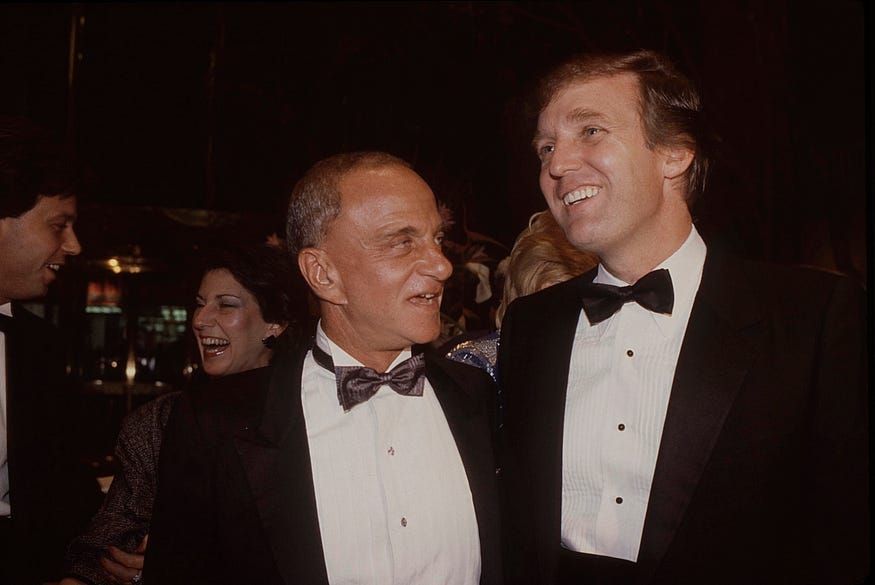The Influence of Roy Cohn: How a Notorious Lawyer Shaped Donald Trump’s Political Playbook
From McCarthyism to the White House: The Lasting Influence of Roy Cohn on Donald Trump’s Rise to Power
The Shadow of Roy Cohn: How a Controversial Lawyer Shaped Donald Trump’s Political Playbook
Introduction
Roy Cohn was a lawyer and political operative whose name is often synonymous with the darker side of American politics. Best known for his role as Senator Joseph McCarthy’s chief counsel during the infamous Red Scare, Cohn’s career was marked by aggressive tactics, a disdain for legal and ethical norms, and an unyielding loyalty to his clients — principles that would later influence a young Donald Trump. This article explores who Roy Cohn was, his relationship with Trump, and how Trump has applied Cohn’s teachings to his own political career.
Who Was Roy Cohn?
Roy Cohn was born in New York City in 1927, into a family with deep political connections. A child prodigy of sorts, Cohn graduated from Columbia Law School at the age of 20 and quickly rose to prominence as a federal prosecutor. His big break came in 1951 when he secured the conviction of Julius and Ethel Rosenberg for espionage, a controversial case that made him a national figure.
Cohn’s most notorious role was as chief counsel to Senator Joseph McCarthy during the early 1950s. As McCarthy’s right-hand man, Cohn played a central role in the anti-communist witch hunts that destroyed countless lives. His tactics were ruthless: he leveraged baseless accusations, manipulated evidence, and bullied witnesses. The McCarthy era left a dark stain on American history, and Cohn was one of its chief architects.
After the fall of McCarthy, Cohn returned to New York City, where he became a lawyer for the rich and powerful. He represented a who’s who of the city’s elite, including mafia figures, business magnates, and celebrities. His legal style was characterized by a brazen disregard for ethical standards, a willingness to exploit the media, and a dogged determination to win at all costs.
Cohn and Trump: The Mentor and the Protégé
In the 1970s, a young real estate developer named Donald Trump was looking to make his mark on New York City. He was introduced to Roy Cohn, who quickly became both his attorney and mentor. Cohn saw in Trump a kindred spirit — a brash, ambitious figure unafraid to bend the rules to achieve success.
Cohn taught Trump many lessons that would define his approach to business and, later, politics. Among the most significant were:
Aggressiveness and Intimidation: Cohn believed that the best defense was a strong offense. He taught Trump to attack his adversaries with relentless ferocity, never showing weakness. Trump applied this lesson throughout his career, using lawsuits and media attacks to overwhelm opponents and critics.
Never Settle, Never Apologize: One of Cohn’s key strategies was to never admit fault and never settle lawsuits, no matter how damaging the evidence. Trump embraced this philosophy, often fighting legal battles to the bitter end and rarely, if ever, issuing apologies for his actions.
Manipulation of the Media: Cohn was a master at using the media to shape public perception. He understood the power of headlines and how to control the narrative. Trump learned this lesson well, turning his name into a brand and later using social media to communicate directly with his base, bypassing traditional media filters.
Loyalty and Retribution: Cohn valued loyalty above all else and expected fierce loyalty from his clients. In return, he was unswervingly loyal to them, often crossing ethical lines to protect their interests. Trump has mirrored this approach in his political dealings, rewarding those who show loyalty and punishing those who cross him.
Winning at All Costs: Cohn’s legal philosophy was centered on winning, no matter the cost or the method. He taught Trump to see life as a series of battles where the only acceptable outcome is victory. This mindset has been evident in Trump’s approach to both business and politics, where he often prioritizes winning over principles or relationships.
Trump’s Application of Cohn’s Tactics in Politics
When Trump entered politics, the lessons he learned from Roy Cohn were on full display. His aggressive, confrontational style, disdain for norms, and willingness to engage in public feuds were all hallmarks of Cohn’s influence. Trump’s approach to the media, where he often attacks journalists and outlets that criticize him, mirrors Cohn’s tactics from decades earlier.
Trump’s refusal to admit mistakes or back down from controversy is another clear example of Cohn’s legacy. Whether it’s allegations of misconduct, legal battles, or political disputes, Trump’s default strategy is to deny, deflect, and counterattack — an approach that kept Cohn’s clients, and later Trump himself, in the spotlight and on the offensive.
In the political arena, Trump’s focus on loyalty and retribution has shaped his relationships with allies and opponents alike. He demands unwavering support from those around him and is quick to cut ties with anyone who shows disloyalty. This has led to a revolving door of advisors and cabinet members in his administration, as well as a polarized political landscape where compromise is rare.
Conclusion
Roy Cohn’s influence on Donald Trump cannot be overstated. As Trump’s mentor, Cohn imparted lessons that have defined Trump’s career in both business and politics. The aggressive tactics, media manipulation, and win-at-all-costs mentality that Cohn practiced are now cornerstones of Trump’s political strategy. Understanding Cohn’s role in shaping Trump’s approach to power offers valuable insights into the former president’s actions and the ongoing impact of his style on American politics.


